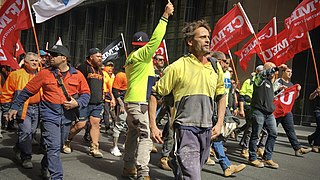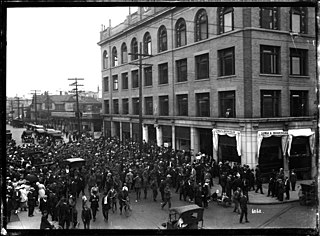The Railway Labor Act is a United States federal law that governs labor relations in the railroad and airline industries. The Act, enacted in 1926 and amended in 1934 and 1936, seeks to substitute bargaining, arbitration, and mediation for strikes to resolve labor disputes. Its provisions were originally enforced under the Board of Mediation, but they were later enforced under a National Mediation Board.

Strike action, also called labor strike, labour strike and industrial action in British English, or simply strike, is a work stoppage caused by the mass refusal of employees to work. A strike usually takes place in response to employee grievances. Strikes became common during the Industrial Revolution, when mass labor became important in factories and mines. As striking became a more common practice, governments were often pushed to act. When government intervention occurred, it was rarely neutral or amicable. Early strikes were often deemed unlawful conspiracies or anti-competitive cartel action and many were subject to massive legal repression by state police, federal military power, and federal courts. Many Western nations legalized striking under certain conditions in the late 19th and early 20th centuries.
Collective bargaining is a process of negotiation between employers and a group of employees aimed at agreements to regulate working salaries, working conditions, benefits, and other aspects of workers' compensation and rights for workers. The interests of the employees are commonly presented by representatives of a trade union to which the employees belong. A collective agreement reached by these negotiations functions as a labour contract between an employer and one or more unions, and typically establishes terms regarding wage scales, working hours, training, health and safety, overtime, grievance mechanisms, and rights to participate in workplace or company affairs. Such agreements can also include 'productivity bargaining' in which workers agree to changes to working practices in return for higher pay or greater job security.

United Kingdom labour law regulates the relations between workers, employers and trade unions. People at work in the UK have a minimum set of employment rights, from Acts of Parliament, Regulations, common law and equity. This includes the right to a minimum wage of £10.42 for over-23-year-olds from April 2023 under the National Minimum Wage Act 1998. The Working Time Regulations 1998 give the right to 28 days paid holidays, breaks from work, and attempt to limit long working hours. The Employment Rights Act 1996 gives the right to leave for child care, and the right to request flexible working patterns. The Pensions Act 2008 gives the right to be automatically enrolled in a basic occupational pension, whose funds must be protected according to the Pensions Act 1995. Workers must be able to vote for trustees of their occupational pensions under the Pensions Act 2004. In some enterprises, such as universities or NHS foundation trusts, staff can vote for the directors of the organisation. In enterprises with over 50 staff, workers must be negotiated with, with a view to agreement on any contract or workplace organisation changes, major economic developments or difficulties. The UK Corporate Governance Code recommends worker involvement in voting for a listed company's board of directors but does not yet follow international standards in protecting the right to vote in law. Collective bargaining, between democratically organised trade unions and the enterprise's management, has been seen as a "single channel" for individual workers to counteract the employer's abuse of power when it dismisses staff or fix the terms of work. Collective agreements are ultimately backed up by a trade union's right to strike: a fundamental requirement of democratic society in international law. Under the Trade Union and Labour Relations (Consolidation) Act 1992 strike action is protected when it is "in contemplation or furtherance of a trade dispute".
Industrial action or job action is a temporary show of dissatisfaction by employees—especially a strike or slowdown or working to rule—to protest against bad working conditions or low pay and to increase bargaining power with the employer and intended to force the employer to improve them by reducing productivity in a workplace. Industrial action is usually organized by trade unions or other organised labour, most commonly when employees are forced out of work due to contract termination and without reaching an agreement with the employer. Quite often it is used and interpreted as a euphemism for strike or mass strike, but the scope is much wider. Industrial action may take place in the context of a labour dispute or may be meant to effect political or social change. This form of communication tends to be their only means to voice their concerns about safety and benefits.

The Australian waterfront dispute of 1998 was an event in Australian industrial relations history, in which the Patrick Corporation undertook a restructuring of their operations for the purpose of dismissing their workforce. The restructuring by Patrick Corporation was later ruled illegal by Australian courts. The dispute involved Patrick Corporation terminating the employment of its workforce and locking out the workers of the workplace after the restructuring had taken place, with many of these workers members of the dominant Maritime Union of Australia. The resulting dismissal and locking out of their unionised workforce was supported and backed by the Australian Liberal/National Coalition Government.

Australian labour law sets the rights of working people, the role of trade unions, and democracy at work, and the duties of employers, across the Commonwealth and in states. Under the Fair Work Act 2009, the Fair Work Commission creates a national minimum wage and oversees National Employment Standards for fair hours, holidays, parental leave and job security. The FWC also creates modern awards that apply to most sectors of work, numbering 150 in 2024, with minimum pay scales, and better rights for overtime, holidays, paid leave, and superannuation for a pension in retirement. Beyond this floor of rights, trade unions and employers often create enterprise bargaining agreements for better wages and conditions in their workplaces. In 2024, collective agreements covered 15% of employees, while 22% of employees were classified as "casual", meaning that they lose many protections other workers have. Australia's laws on the right to take collective action are among the most restrictive in the developed world, and Australia does not have a general law protecting workers' rights to vote and elect worker directors on corporation boards as do most other wealthy OECD countries.

United States labor law sets the rights and duties for employees, labor unions, and employers in the US. Labor law's basic aim is to remedy the "inequality of bargaining power" between employees and employers, especially employers "organized in the corporate or other forms of ownership association". Over the 20th century, federal law created minimum social and economic rights, and encouraged state laws to go beyond the minimum to favor employees. The Fair Labor Standards Act of 1938 requires a federal minimum wage, currently $7.25 but higher in 29 states and D.C., and discourages working weeks over 40 hours through time-and-a-half overtime pay. There are no federal laws, and few state laws, requiring paid holidays or paid family leave. The Family and Medical Leave Act of 1993 creates a limited right to 12 weeks of unpaid leave in larger employers. There is no automatic right to an occupational pension beyond federally guaranteed Social Security, but the Employee Retirement Income Security Act of 1974 requires standards of prudent management and good governance if employers agree to provide pensions, health plans or other benefits. The Occupational Safety and Health Act of 1970 requires employees have a safe system of work.
Trade unions in Malaysia are regulated by the Trade Unions Act of 1959 and the Industrial Relations Act of 1967.
Enterprise bargaining is an Australian term for a form of collective bargaining, in which wages and working conditions are negotiated at the level of the individual organisations, as distinct from sectoral collective bargaining across whole industries. Once established, they are legally binding on employers and employees that are covered by the Enterprise bargaining agreement. An Enterprise Agreement (EA) consists of a collective industrial agreement between either an employer and a trade union acting on behalf of employees or an employer and employees acting for themselves.

The Canada Labour Code is an Act of the Parliament of Canada to consolidate certain statutes respecting labour. The objective of the Code is to facilitate production by controlling strikes & lockouts, occupational safety and health, and some employment standards.

The Trade Union and Labour Relations (Consolidation) Act 1992 is a UK Act of Parliament which regulates United Kingdom labour law. The act applies in full in England and Wales and in Scotland, and partially in Northern Ireland.
Japanese labour law is the system of labour law operating in Japan.

Labor relations or labor studies is a field of study that can have different meanings depending on the context in which it is used. In an international context, it is a subfield of labor history that studies the human relations with regard to work in its broadest sense and how this connects to questions of social inequality. It explicitly encompasses unregulated, historical, and non-Western forms of labor. Here, labor relations define "for or with whom one works and under what rules. These rules determine the type of work, type and amount of remuneration, working hours, degrees of physical and psychological strain, as well as the degree of freedom and autonomy associated with the work." More specifically in a North American and strictly modern context, labor relations is the study and practice of managing unionized employment situations. In academia, labor relations is frequently a sub-area within industrial relations, though scholars from many disciplines including economics, sociology, history, law, and political science also study labor unions and labor movements. In practice, labor relations is frequently a subarea within human resource management. Courses in labor relations typically cover labor history, labor law, union organizing, bargaining, contract administration, and important contemporary topics.

The New Zealand Employment Relations Act 2000 is a statute of the Parliament of New Zealand. It was substantially amended by the Employment Relations Amendment Act 2001 and by the ERAA 2004.

The Pennsylvania Association of Staff Nurses and Allied Professionals (PASNAP) is a labor union in Pennsylvania that represents about 8,300 nurses and allied health professionals.
A whipsaw strike is a strike by a trade union against only one or a few employers in an industry or a multi-employer association at a time. The strike is often of a short duration, and usually recurs during the labor dispute or contract negotiations—hence the name "whipsaw".

Wilson v United Kingdom [2002] ECHR 552 is a United Kingdom labour law and European labour law case concerning discrimination by employers against their workers who join and take action through trade unions. After a long series of appeals through the UK court system, the European Court of Human Rights held that ECHR article 11 protects the fundamental right of people to join a trade union, engage in union related activities and take action as a last resort to protect their interests.
South African labour law regulates the relationship between employers, employees and trade unions in the Republic of South Africa.
Turkish labour law provides a number of protections to employees, governed by the Labor Code, Trade Union Law, and the Constitution.











